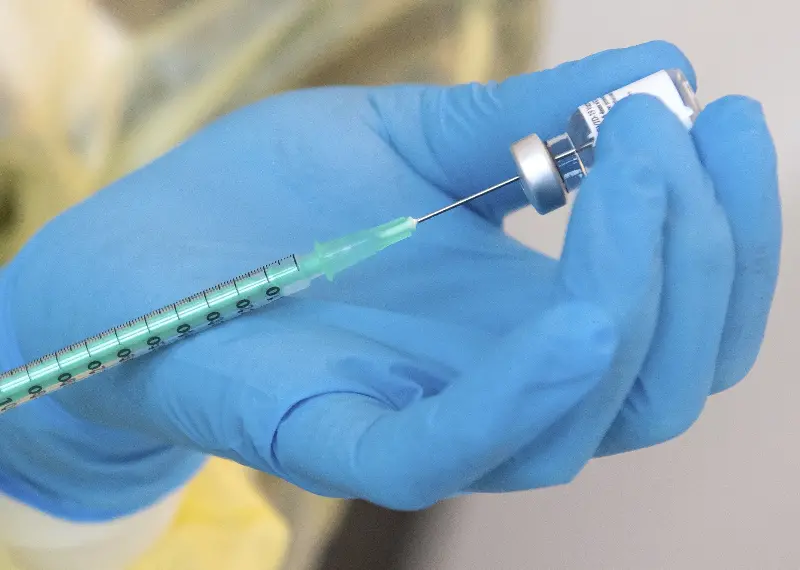
Rick Bright, the former director of the Biomedical Advanced Research and Development Authority (BARDA) has warned that Department of Health and Human Services' decision to cut funding for mRNA vaccine development could threaten American national security.
"BARDA wasn't the only government agency making early investments in mRNA research," Bright wrote in an opinion piece for The New York Times. "The Department of Defense and the Defense Advanced Research Projects Agency had already recognized mRNA's potential for swift action against emerging biological threats, including those that might be weaponized."
It comes after HHS Secretary Robert F. Kennedy Jr. announced the termination of 22 mRNA development investments and the reallocation of roughly $500 million at the beginning of this month.
Why it Matters
Bright said the mRNA platform had been central to the fast response to COVID-19 and that abandoning the technology would undermine the nation's ability to respond quickly to future biological threats.
Multiple scientists and doctors have spoken out against this decision, including infectious diseases expert Dr. Thomas A. Russo, who told Newsweek that mRNA vaccines "will be critical when the next, inevitable infectious diseases crisis rears its ugly head."
What To Know
On August 5, the HHS confirmed it would cancel $500 million in mRNA vaccine development contracts, impacting research teams and proposals—including those from Emory University, Tiba Biotech, Pfizer, Sanofi Pasteur and others.
The projects reportedly targeted respiratory viruses including seasonal influenza, COVID-19, RSV and H5N1 and included work by major industry and academic teams.
Secretary Kennedy argued that the data showed mRNA vaccines had not met expectations for preventing upper respiratory infections and that HHS would shift funding toward other vaccine platforms.
But Bright praised mRNA technology, saying that the "unprecedented speed" with which a COVID-19 vaccine was developed in 2020 "was possible only because years earlier, the United States had invested" in it.
"This decision undercuts one of the most significant medical advances in decades, technology that could protect millions more people from the threats ahead," Bright said.
"I know the stakes because I was BARDA's director when the United States made the decision to invest heavily in mRNA," he said. "That investment did not begin with Covid-19. It began in 2016, when we faced the Zika virus outbreak."
"We needed a way to design a vaccine in days, not years, to protect pregnant women and their babies from devastating birth defects. Older vaccine approaches were too slow," Bright continued. "The solution was mRNA: a flexible, rapid-response technology that could be reprogrammed for any virus once its genetic sequence was known. That early investment laid the groundwork for the lightning-fast Covid-19 response four years later."
Kennedy said in a post on X the time: "We reviewed the science, listened to the experts, and acted. BARDA is terminating 22 mRNA vaccine development investments because the data show these vaccines fail to protect effectively against upper respiratory infections like COVID and flu," Kennedy said in a post on X. "We're shifting that funding toward safer, broader vaccine platforms that remain effective even as viruses mutate."
Newsweek has contacted the HHS, via online inquiry form, for a response to Bright's comments.
What People Are Saying
Former BARDA director Rick Bright said in his NYT op-ed: "Like every technology, mRNA has limitations. Vaccines meant to protect against respiratory infections, whether developed through mRNA or older technologies, are generally better at averting severe disease than preventing infection. It is a scientific challenge we can address with next-generation vaccines. The answer to limitations is improvement, not abandonment.
"Political narratives about mRNA have fueled confusion, which leads to mistrust, yet the scientific evidence consistently shows that this technology is safe and effective and holds enormous potential for future vaccines and treatments."
Children's Health Defense, an anti-vax nonprofit founded by Kennedy Jr. which focuses on childhood health epidemics, said in a post on X: "CHD applauds this most recent announcement to defund 22 mRNA vaccine projects under BARDA. While we believe that the mRNA shots on the market are unsafe and should be off the market, this is a welcome step in the right direction. The pandemic preparedness industry as it exists today is a threat to human welfare."
What Happens Next
HHS said it would shift funding toward other vaccine platforms but did not provide detailed timelines or specify which programs would receive redirected support.
Scientific organizations, industry groups and public-health leaders said they would assess the impact and consider next steps, while some public-health advocates announced initiatives to defend vaccine science and provide public information.
Related Articles
- Toothpaste Made From Your Own Hair May Repair Your Teeth
- The Secret to Slowing Down Aging Could Come From a Surprising Source
- Man 'Shocked and Amazed' as Brother's Remains Found in Antarctica After 66 Years
- Blue Whales Go Silent Off California Coast, Sparks Alarm Among Scientists
